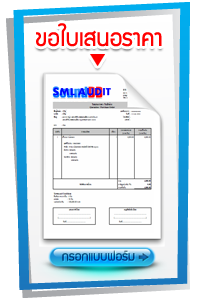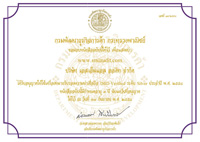บริษัท เอสเอ็มแอล ออดิท จำกัด เลขทะเบียนนิติบุคคล 0115555017811 -สาขาบางนา,สมุทรปราการ
ที่อยู่ : เลขที่ 599/43 ซอยก่อนตึกแอคเซียม ถนนกิ่งแก้ว-บางพลี หมู่ 7 ตำบล : บางพลี
อำเภอ : บางพลี จังหวัด :สมุทรปราการ รหัสไปรษณีย์ : 10540
มือถือ : 080-553-7088 /080-5537077 โทร :023494340 /02-758-8994 แฟกซ์ : 021020819
อีเมล :sale@smlaudit.com, smlaudit@hotmail.com
เว็บไซต์ : www.smlaudit.com
| Chapter 3 Industrial Licensing and Regulations 1: The Factory A c t The Factory Act of 1969 (amended in 1972, 1975, 1979, and 1992) stipulates regulations for factory construction and operation, factory expansion, and safety requirements. The latest revision of the Act also imposes strict controls on industrial pollution. The Act is administered by the Department of Industrial Works of the Ministry of Industry. A factory is defined as any premise that uses machinery equivalent to five horsepower or more, or that employs seven or more workers for manufacturing, producing, assembling, packing, repairing, maintaining, testing, improving, processing, conveying, storing or destroying anything included in the classes or types of factories presently listed in the Ministerial R e g u l a t i o n s . The Act does not apply to factories owned or operated by government agencies for the purpose of national security or safety, except that such factories must use the procedures of the Act as guidelines for their opera-t i o n s . 2: Factory Licenses Factories are divided into three categories: • Factories that do not require licensing. Factories that only require notification to officials in advance of the start of operations. Operators may commence operations as soon as they receive a receipt form from the Ministry stating their report has been received. Factories that require licenses prior to operation. Subject to the Ministry’s discretion, operators may be granted, prior to the license, a certificate allowing them to build parts of the factory. Note: In general, the degree of government contro l re q u i red is dependent on the degree of enviro n m e n t a l p rotection deemed necessary. The more likely a facto ry, based on its output, is to cause pollution, the more that type of factory is re g u l a t e d . The Ministry of Industry has the power to issue regulations for all of the categories regarding: Description, category, or type of machinery and equipment to be used in the operation of the factory b u s i n e s s . Location, environment, interior, and description of the factory. Requirements for workers who have specific knowledge to carry out any duties in the factory. Process of manufacture and provision of equipment to prevent, stop, or alleviate danger, damage, or disturbances that may occur to the public or property in the factory or nearby premises. Standards and procedures for the control or release of waste, pollution, or anything else arising from factory operations which may affect the environment. Provision of necessary data and documents by the factory operators to ensure compliance with the law. Provision of anything that may affect the safety of work operations. If there is an inspection of a factory or machinery to ensure compliance with the Act, a private body may carry out the inspection and report in place of government officials, provided the private persons follow the regulations concerning the Act as per the Government G a z e t t e . Licenses granted are valid until the end of the fifth calendar year from the year in which the business started operations, except when the factory is transferred, leased or subject to hire purchase, or if operations stop. In these cases, the license is regarded as having expired on the date of issuance of a license to the factory’s new operators, or on the date of cessation of operations. Applications for renewal of licenses must be submitted prior to the date of expiration, along with a fee of 100,000 baht. Following submission, renewal is considered to have been extended unless there is a specific order otherwise. If the application is submitted within 60 days of the expiration date, it will be processed n o r m a l l y, but an additional fee of 20,000 baht will be levied. Once the expiry date is reached, an application for a renewal must be made within 60 days. 3: Factory Operations The Ministry of Industry has the power to designate: The size and quantity of the type of factory in each category which should not be established or expanded in any locality in the Kingdom. The type, quality, source of origin, and ratio of raw materials to be used in a factory. The type or quality of products to be manufactured in a factory.• The type of energy to be used in a factory. The Ministry may also prescribe that a factory’s products be used in certain industries or be wholly or partly exported. If a factory in category 2 or 3 (See Section A above) stops operation for more than one year, the operator must notify the Ministry in writing within seven days of the date the one-year period has lapsed, and must inform the Ministry before restarting operations. If the operator’s factory is in category 3, he must receive written permission from the Ministry before restarting operations. If there is an accident that causes death, injury, or sickness that incapacitates a worker beyond a 72-hour period, the operator must inform the Ministry within three days from the date of the death or the lapse of the 72 hour period. If there is an accident that causes the factory to stop operations for more than seven days, the operator must notify the Ministry within 10 days from the date of the accident. Factory operators must obtain permission to remove machinery from its original place of installation to another site for temporary operations, or to move a factory to another site. Permission must also be obtained to transfer, rent, offer for hire purchase, or sell a licensed factory. In these cases, the prior license is considered to have expired, and a new license must be applied for within seven days, although no fee is required. If the licensee dies, the heir or administrator of the estate must submit an application for the transfer of the license within 90 days of the date of death. 4: Factory Expansion An application must be filed, and granted, prior to factory expansion. A fee of 100,000 baht is charged. A s defined in the Act, the following undertakings constitute factory expansion: • An increase in the number of machines, or change or modification of machinery to increase its power by 50 percent or more. The addition to, or alteration of, any part of the factory building which causes any part of the foundation of the factory to bear a load of an additional 500 kilograms or more. When a licensee: – Increases the quantity of machinery Changes or modifies machinery used for production or generation of power, but by less than 50 percent Constructs or increases factory space by more than 100 square meters, application must be filed within seven days of the date of the change. 5: Other P ro v i s i o n s Any factory that is seriously endangering the public may be ordered to cease operations or to make specified improvements. The Minister has the authority to order removal of all or part of the plant to a location where the public will not be threatened. Officers of the Ministry of Industry have broad powers of inspection, and are authorized to issue written orders requiring a factory to cease operations, modify or repair machine r y, or to undertake other remedial measures. Issuance of either a factory establishment license or a factory operator’s license does not exempt the licensee from compliance with other central or local government requirements for carrying out a proposed industrial activity. Licenses may be suspended for violations of the Act or for failure to carry out orders issued under the Act by competent off i c i a l s . Factories established to produce and sell food and drugs must also apply for production licenses from the Ministry of Health. Violation of certain provisions of the Act may incur penalties in the nature of a fine or imprisonment not exceeding four years. A Case Settlement Committee of three experts is appointed by the Ministry to carry out penalties for violations of the A c t . If the offender is a partnership, company or other juristic entity, the directors, managers, or other persons responsible for committing the offense are subject to the same punishment unless it can be proved that the o ffense was committed without their knowledge or c o n s e n t . |


 บุคคลทั่วไป 7 คน
บุคคลทั่วไป 7 คน

